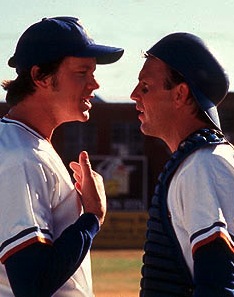Friday, June 17, 1988.
BULL DURHAM. Music by Michael Covertino. Written and directed by Ron Shelton. Running time: 100 minutes. Restricted entertainment with the B.C. Classifier's warning: frequent very coarse language, occasional nudity and suggestive scenes.
THE KID HAS TALENT. The organization recognized that right away, signing Ebby Calvin LaLoosh (Tim Robbins) to its Carolina League farm team, the Durham Bulls.
What the kid needs is seasoning. According to the Bulls' manager, Joe "Skip" Rigging (Trey Wilson), his young pitcher has "a million-dollar arm and a five-cent head."
In its wisdom, the organization sends veteran catcher "Crash" Davis (Kevin Costner) down to Durham. After 12 years in the minors, Davis is nearing the end of his playing career.
He does, however, have a professional's experience. He's there to take the undisciplined LaLoosh in hand. "We want you to mature the kid," says Rigging.
The director is a talent. That's clear from Ron Shelton's debut feature, the character-rich sports romance called Bull Durham.
We already knew he could write. Since giving up his own pro ball career, Shelton has provided director Roger Spottiswoode with the screenplays for 1983's Under Fire and The Best of Times (1986).
Spottiswoode, in turn, provided Shelton with valuable seasoning, using him as a second-unit director on both of those pictures.
With Bull Durham, Shelton puts it all together, capably directing a comically edged tale of minor leaguers from his own skilfully crafted script. In it. he combines the great American pastime (baseball) with the alI-American obsession (sex) to produce a multi-faceted movie gem.
At its heart is the Bulls' most dedicated fan, part-time junior college instructor Annie Savoy (Susan Sarandon). After trying "all the major religions," she has come "to believe in the Church of Baseball."
Her form of worship is to select a seasonal lover from the home team's roster, a promising lad whom she can improve. This year, her choice is Laloosh.
The trouble is that she really likes Davis. If she were less dedicated, if he were less stubborn, it could have been different.
A sly tale of relationships, Bull Durham offers a sharply observed examination of male pair-bonding and the male-female struggle. Though he benefits from both, the "young, wild, dim pretty boy" Laloosh never quite understands what's going on between his antagonist mentors.
What's happening, of course, is the beginning of a mature love, something that none of the participants immediately understands. What they do understand is the game, epitomized by elevation to "the show" — the major leagues where "the hotels all have room service (and) the women all have long legs and brains."
The best sports movie since 1977's Slap Shot, Bull Durham works because Shelton makes the game — "the greatest show on dirt" — an extension of the human comedy. Costner, in his own best film role yet, is perfectly paired with the lovely Sarandon, who deftly balances sweet spirituality with earthy sexuality. The result is a sports movie masterpiece.
The above is a restored version of a Province review by Michael Walsh originally published in 1988. For additional information on this archived material, please visit my FAQ.
Afterword: On screen, Bull Durham's happy ending involves Kevin Costner's character, "Crash" Davis, getting the girl: Susan Sarandon's Annie Savoy. Off screen, the film's happy ending found Tim Robbins in a real-life romance with Sarandon. In 1995, Robbins directed his companion in the prison drama Dead Man Walking, a performance that won Sarandon a best actress Academy Award. They remained a couple until late 2009, a relationship that produced two children.
For Coster, his Bull Durham turn built upon the major acting breakthrough he'd made a year earlier playing T-Man Eliot Ness in Brian De Palma's The Untouchables. He championed the great American pastime for a second time in 1989's best picture nominee Field of Dreams, director Phil Alden Robinson's adaptation of Canadian author W.P. Kinsella's novel Shoeless Joe. Costner returned to the diamond as a pitcher in 1999's Sam Raimi sports drama, For Love of the Game, and his character is identified as an ex-baseball star in director Mike Binder's 2005 romantic comedy, The Upside of Anger. In common with his Bull Durham teammate Robbins, Costner stepped up to the directorial plate, knocking it out of the park with his debut feature, 1990's Dances With Wolves. The revisionist Western was nominated for 12 Oscars and won seven, including three that went to Costner personally: best picture, director and actor.
In retrospect, it was the high point of his creative career. Subsequent performances in such big-budget films as 1991's Robin Hood: Prince of Thieves, Wyatt Earp (1994) and his second feature as director, The Postman (1997), earned him only Razzie Award wins. With a mixture of good work — Oliver Stone's 1991 blockbuster JFK , Clint Eastwood's A Perfect World (1993) and Costner's third (and final) feature as director Open Range (2003) — and some not so good to his credit, the actor embraced other interests. In common with Nicolas Cage, Costner now writes comic books. In 2015, he released the 784-page graphic novel The Explorers Guild: A Passage to Shambhala, a period adventure co-written with John Baird and illustrated by Rick Ross. A movie adaptation is a very real possibility. Kevin Costner turns 61 today (January 18).
